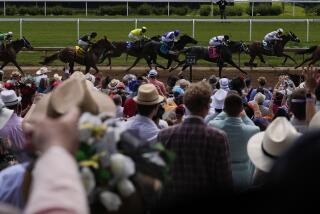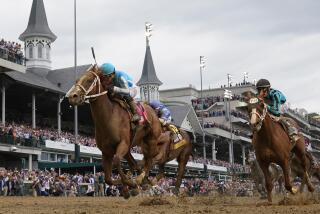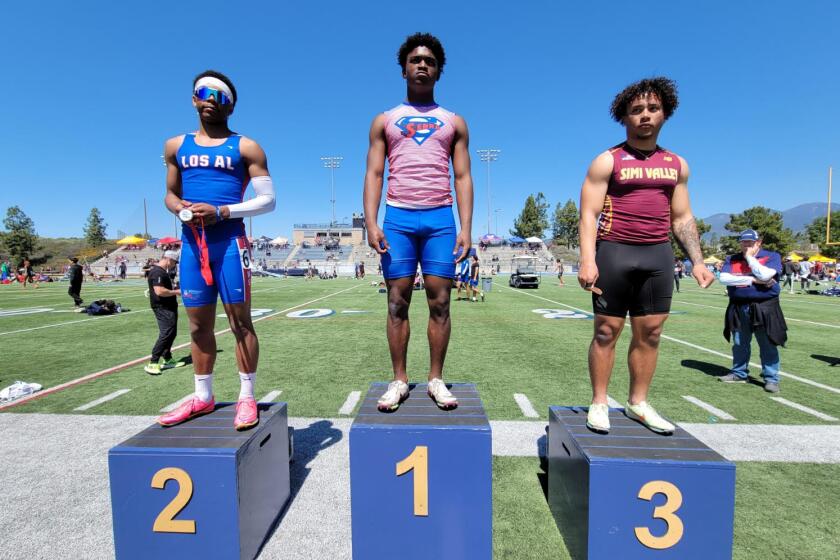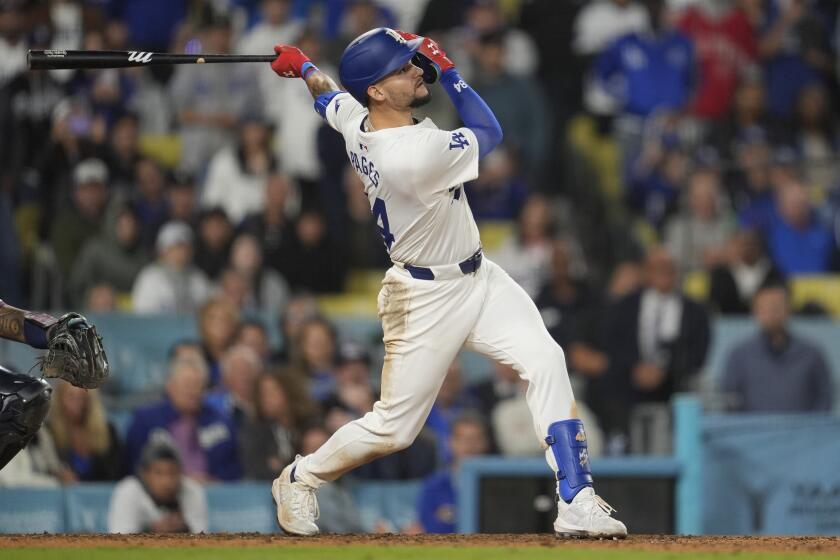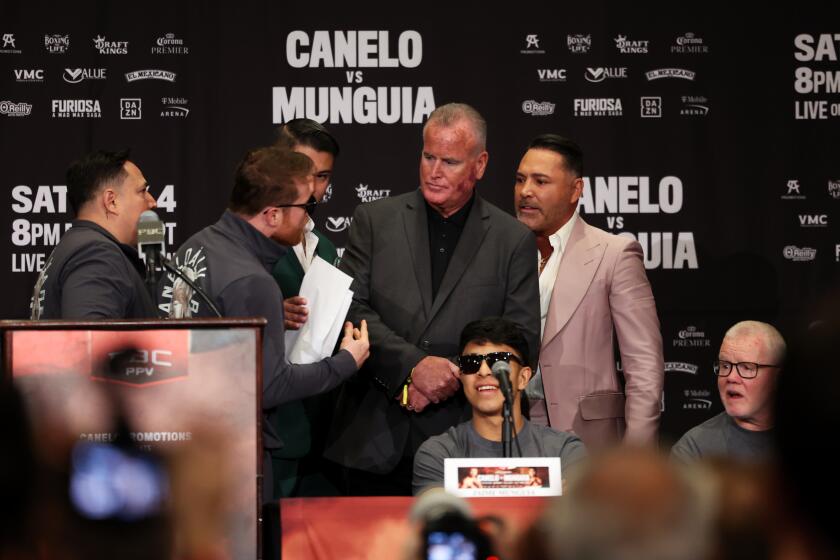Edberg Calls Time, No Strings Attached
In the little village by the Baltic Sea where the Volvos roll past, one after the other, the policeman’s son learned quickly not to make his passions other people’s concern.
That was many years, many continents, many trophies ago.
And Stefan Edberg simply wants to go back.
Not back to Vastervik, the tiny tourist town on the southeast coast of Sweden where he grew up. Vastervik is too small for the colossal persona that surrounds Edberg these days. What Edberg is looking for, however, is the kind of life he knew there: orderly, private.
After a tennis career that has included six Grand Slam victories and 10 consecutive years ranked in the top 10, Edberg, 30, is bidding farewell to the Assn. of Tennis Professionals tour this year. After playing his final tournament at the Stockholm Open in November, he will take his wife, Annette, and his 3-year-old daughter, Emilie, and draw up a world around them. As much as it can be, it will be a world of anonymity.
“I’m always going to be known, for the rest of my life, but hopefully it will get better,” he said.
Given his famously restrained personality, it is curious that Edberg would chose to end his career amid the pomp of a yearlong farewell tour, which will hit the Los Angeles Tennis Center at UCLA on Monday, when the Infiniti Open begins.
“It’s actually for the fans,” Edberg said. “Part of the reason is to say sort of a last goodbye to them and give them a chance to come out.”
Such diplomacy is Edberg’s trademark. He has won the ATP’s sportsmanship award so many times, the trophy this year was renamed the Stefan Edberg Sportsmanship Award. He won the award, which is voted on by players, in 1988, ‘89, ‘90, ’92 and ’95.
“He’s one of the most honest people you could ever wish to meet,” said Tony Pickard, who coached Edberg from 1983 to ’94. “It would be impossible to say something bad about the young man.”
Edberg’s placid demeanor, however, has confounded the press. His personality has been called everything from “oatmeal” to “icy” to “bland” and “boring.”
“I think maybe the classiest thing about Stefan is that [the media] can’t find anything to write about except for his grace and his sportsmanship,” said Todd Martin, winner of the sportsmanship award in 1993 and ’94.
Looking for an angle, reporters time and again have prodded Edberg to tell one of his favorite Norwegian jokes.
“They’re not even funny any longer,” Edberg said, shaking his head.
Desperate for a revealing story, an English tabloid once published this shocking report: “Edberg--gasp--washes his own laundry.” (Not true).
It’s difficult to pinpoint when Edberg’s life became the focal point of such scrutiny. His parents, Bengt and Barbro, might have divined it when they used their home as collateral to pay for his junior tennis lessons. They warned him to keep defeat in perspective.
“It’s another day tomorrow,” they would say.
Edberg pocketed that advice and in 1983, at 17, became the first player to win the junior Grand Slam.
The next year, Edberg won the Olympic tennis demonstration at the Los Angeles Tennis Center and the comparisons officially began. The media said he looked like the latest model off the Stockholm assembly line that produced Bjorn Borg and Mats Wilander.
Comparisons to Borg were overwhelming for the young Edberg.
“He gave me a lot of inspiration at the very early stage, and I think he was probably one of the biggest stars that’s ever been in sports,” Edberg said.
Unlike Borg and Wilander, Edberg refused to stay at the baseline, charging the net for volleys like some kind of John McEnroe protege.
Edberg served notice that there was a new breed of Swede in power in 1985, when he denied Wilander a third-consecutive Australian Open title, 6-4, 6-3, 6-3, in the final. After Edberg won, Wilander rushed to the net and hugged him.
But Edberg and Wilander were never that close because they were dueling for the right to inherit Borg’s crown.
“We were sort of competing [to be] the best Swede at the time, so we had a little bit of a rivalry,” said Edberg, who would eventually marry Wilander’s childhood sweetheart, Annette Olsen.
Of considerably more consequence on the court, however, was Edberg’s rivalry with Boris Becker. Edberg and Becker pounded each other in three consecutive Wimbledon finals, defining a chapter in the tournament’s history.
Like any good thriller, the chapter opened on a foggy afternoon in 1988. Edberg led, 3-2, before rain drove the players from the court for the day. Play was interrupted again the next day with Becker leading, 5-4, in the first set. It was two hours before they returned and Becker, then 20, won the set, 6-4.
But after that, Edberg’s serve-and-volley game swung into high gear. The 22-year-old won his first Wimbledon championship, 4-6, 7-6, 6-4, 6-2, then in one of his few displays of emotion on the court, fell back on the grass.
“That was a very special tournament for me, a very big win. I think it was very important for the rest of my career,” he said.
Edberg lost in the 1989 French Open final to Michael Chang in what would be the only appearance in a final at Roland Garros Stadium and then lost to Becker in the 1989 Wimbledon final.
So, it was a determined Edberg who faced Becker in the 1990 Wimbledon final. Edberg came back from a 3-1 deficit in the fifth set to win, 6-2, 6-2, 3-6, 3-6, 6-4, and Becker climbed over the net to hug him.
A month later, Edberg moved past Ivan Lendl for the top spot in the world. He hovered around the No. 1 through 1991 and in 1992, he defeated Pete Sampras to win his second-consecutive U.S. Open.
Barring a miracle at September’s U.S. Open, Edberg’s 1992 U.S. Open victory will go down as his final Grand Slam title.
The descent was gradual. He won one tournament in 1993 and three in 1994.
In February last year, however, Edberg slipped out of the top 10 in the rankings for the first time since 1985. A few months later at Wimbledon, he lost in straight sets to Dick Norman in the second round.
“What am I doing? Why is this happening?” Edberg said to himself. “Maybe it is time for you to go now, Stefan.”
In October, Edberg fell out of the top 20. Two months later he announced his farewell tour. Many were puzzled by the announcement, and not just because of Edberg’s normally reticent nature.
Said Wilander: “Tennis for me . . . is an emotional thing and it is a passion and I think once you lose the fire, you lose the fire. I cannot see myself playing having decided in my head that I am going to quit in a year because what happens if you enjoy it in six months or suddenly start playing great?”
It seemed like that would not present a problem in the beginning of the year, when Edberg did not advance past the second round in his first four tournaments. But in May, Edberg defeated fourth-seeded Chang in the third round of the French Open. The next month, he advanced to the final at the Queen’s grass-court tournament at London, where he met a familiar foe.
Becker took the title, 6-4, 7-6, then took the microphone at center court.
“You’ve been a friend, a rival and somebody who shared the spotlight with me for a long time,” Becker said to Edberg. “You are truly the best ambassador that I have ever seen for tennis.”
Shortly after that, Edberg climbed to the No. 20 spot, but he said he had no second-thoughts.
“A lot of people have tried to change my mind about retiring, but if I’ve decided something, I stand for it,” he said.
Edberg decided not to play in the Olympics this year even though he is one of five players to play in the last three Olympic Games.
“I felt that it was time for some of the young Swedish players to go,” he said.
Edberg, seeded fifth in the Infiniti Open, will play his first-round match Tuesday night at 7:30.
Everywhere Edberg has played this year he has received standing ovations, and Los Angeles, where Edberg won in 1990, probably will be no different. After the fanfare dies down, he will retire to his home in London with his $20-million career earnings.
“You can be pretty anonymous in London because it is such a big city,” he said.
The senior tour is bound to beckon, but that is still five years away for him. In the meantime, he will dabble in management with the Stefan Edberg Foundation, which supports junior tennis players in Sweden, and may play a few exhibitions if anybody asks.
“I think I will do bits [of different things] really to get a feeling of something I really want to do,” he said. “After a couple of months, there’s a great possibility that [I] sort of will be sitting, watching television and probably will miss the game a little bit, I’m sure about that. I think it will be nice in the beginning just to get away, though.”
Away to his own, private Vastervik.
* KING KRAJICEK
He lives in Monte Carlo, likes designer clothes and spy novels and is the Wimbledon champion. C2
More to Read
Get our high school sports newsletter
Prep Rally is devoted to the SoCal high school sports experience, bringing you scores, stories and a behind-the-scenes look at what makes prep sports so popular.
You may occasionally receive promotional content from the Los Angeles Times.
